WHAT ARE MOUTH ULCERS?
Mouth ulcers are small, painful sores that can develop anywhere in the oral cavity, including the gums, tongue, inner cheeks, lips, or the roof of the mouth. They often cause discomfort while eating, drinking, and speaking. These ulcers typically appear red, yellow, or white and are generally harmless, healing on their own within a week or two. However, they can be quite irritating for most people.
While the exact cause of mouth ulcers is often unclear, they may result from factors such as minor injuries, allergies, stress, nutritional deficiencies, or underlying health conditions.
This page will discuss the symptoms, possible causes, and effective treatment options for managing mouth ulcers.

TYPES OF MOUTH ULCERS
There are various types of mouth sores and lesions, each with unique characteristics:
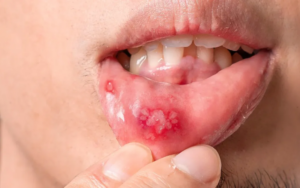
Canker Sores (Aphthous Ulcers):
These are the most common type of mouth ulcers, appearing as white or yellow sores with red borders. While their exact cause is unclear, factors like minor injuries, acidic foods, and stress may contribute to their development.
Oral Lichen Planus:
This condition leads to itchy rashes and white, lace-like sores inside the mouth. It is an immune system response that primarily affects women and individuals assigned female at birth, especially those over 50.
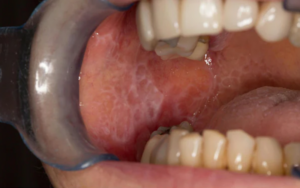
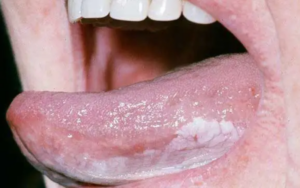
Leukoplakia:
Leukoplakia appears as white or gray patches inside the mouth due to excessive cell growth. It is often linked to chronic irritation from tobacco use but can also occur without a clear cause. These patches are usually non-cancerous.
Erythroplakia:
These red patches develop on the oral membranes, including the tongue, inner cheeks, or floor of the mouth. Unlike leukoplakia, erythroplakia is more likely to be precancerous or cancerous and is commonly associated with tobacco use.
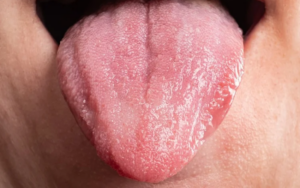
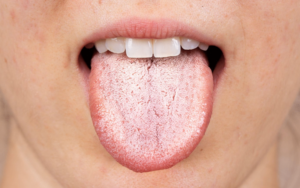
Oral Thrush:
A fungal infection caused by an overgrowth of Candida albicans, oral thrush presents as red or creamy white patches in the mouth. It often occurs in individuals with weakened immune systems or those undergoing antibiotic treatment.
Mouth Cancer:
In rare cases, oral cancer may present as persistent red or white sores or ulcers that do not heal. Any mouth ulcer lasting longer than three weeks should be evaluated by a healthcare professional.
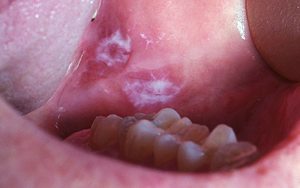
CAUSES OF MOUTH ULCERS
The exact cause of mouth ulcers can be difficult to pinpoint, as multiple factors may contribute to their development. Women, children, adolescents, and those with a family history of ulcers are generally more prone to experiencing them.
1. Physical Trauma or Injury:
Accidental biting of the cheek or tongue
Dental procedures or ill-fitting dental appliances
Hard brushing or use of irritating toothpaste
Sports-related injuries
Burns or cuts from hot foods and drinks
2. Irritants and Sensitivities:
Toothpaste or mouthwash containing sodium lauryl sulfate (SLS)
Acidic or spicy foods and beverages
Food allergies or intolerances
3. Nutritional Deficiencies:
Lack of essential nutrients such as vitamin B12, folate (B9), vitamin D, iron, and zinc
4. Hormonal Changes:
Menstruation, pregnancy, puberty, and menopause
5. Stress and Lifestyle Factors:
Emotional stress and anxiety
Sleep deprivation
Quitting smoking
6. Infections:
Bacterial, viral, or fungal infections, including hand, foot, and mouth disease
7. Medications:
Certain NSAIDs, beta-blockers, and pain relievers
8. Underlying Health Conditions:
Autoimmune diseases (e.g., lupus, oral lichen planus, Behçet’s disease)
Inflammatory bowel diseases (e.g., Crohn’s disease, ulcerative colitis)
Celiac disease
HIV/AIDS
A weakened immune system
HOW ARE MOUTH ULCERS DIAGNOSED?
Most mild mouth ulcers are easily recognizable and do not require extensive evaluation. However, if you consult a doctor, the diagnosis typically involves the following steps:
1. Visual Examination:
A simple clinical examination is usually sufficient for a healthcare provider to diagnose mouth ulcers. They will assess the location, type, and appearance of the sores.
2. Medical History:
Your doctor will discuss your medical history, including possible triggers and related symptoms. They may also ask about the frequency, duration, and severity of your ulcers to gain a better understanding of your condition.
3. Further Investigations (If Needed):
For severe, persistent, or recurring ulcers, additional tests may be recommended to identify the underlying cause:
Complete Blood Count (CBC): Helps detect infections, anemia, or other blood-related issues.
C-Reactive Protein (CRP) & Erythrocyte Sedimentation Rate (ESR): These tests assess inflammation in the body, which may be linked to certain medical conditions causing ulcers.
Vitamin B12 & Folate (B9) Tests: Identifies deficiencies that may contribute to ulcer formation.
Other Specific Tests: Additional investigations may be conducted if necessary to rule out underlying health conditions.
TREATMENT FOR MOUTH ULCERS
While most mouth ulcers heal on their own within a few days to two weeks, understanding how to manage them can help relieve pain, speed up recovery, and reduce the chances of recurrence. Several home remedies are available to ease discomfort, and if these don’t work, over-the-counter (OTC) medications can provide relief while you seek professional advice.
Home Remedies and Over-the-Counter Treatments:
1. Topical Applications:
Baking soda paste
Milk of magnesia
OTC benzocaine products (e.g., Orajel, Anbesol)
Applying ice directly to the sore
2. Mouth Rinses:
Saltwater or baking soda rinse
Antiseptic mouthwashes
3. Natural Remedies:
Echinacea, myrrh, and licorice root (available in teas or oils)
Applying damp tea bags to the ulcer for soothing effects
4. Nutritional Supplements:
Vitamin B9 (folate), vitamin B12, zinc, and iron supplements if a deficiency is identified
Prescription Treatments (For Severe or Recurrent Ulcers):
1. Topical Medications:
Steroid ointments (e.g., triamcinolone)
Pain-relieving gels or ointments
2. Oral Medications (Prescribed by a Doctor):
Steroid tablets
Immunosuppressants (for severe cases)
3. Medicated Mouth Rinses:
Steroid-based rinses to reduce pain and inflammation
Antimicrobial mouthwashes (e.g., chlorhexidine) to prevent infections
4. Cauterization (For Severe Cases):
Laser therapy or silver nitrate application to relieve pain and accelerate healing
DO'S AND DONT'S WITH MOUTH ULCERS
| Do’s | Don’ts |
|---|---|
| Maintain good oral hygiene. | Avoid using harsh or irritating toothpaste. |
| Manage stress effectively. | Refrain from skipping meals or consuming excessively spicy foods. |
| Follow a balanced and nutritious diet. | Do not ignore persistent symptoms. |
| Visit a healthcare professional for regular check-ups. | Never neglect oral health check-ups. |
FREQUENTLY ASKED QUESTIONS
Q1. Can Mouth Ulcers Lead to Oral Cancer?
Mouth ulcers themselves do not cause oral cancer. However, persistent, painful ulcers that do not heal for weeks—especially those located beneath the tongue—should be examined by a healthcare professional, as they could be a sign of oral cancer.
Q2. How Are Mouth Sores Treated?
Most mouth ulcers heal within a week. To manage them at home, stay hydrated and avoid hot or spicy foods. Warm saltwater rinses and applying antiseptic gels can also help reduce discomfort and promote healing.
Q3. How Long Do Mouth Ulcers Take to Heal?
Mild ulcers typically heal within one to two weeks without treatment. However, severe or painful ulcers may take up to six weeks to heal. If the ulcer persists, consulting a dentist is recommended for faster relief.
PEOPLE WHO VIEWED THIS PAGE ALSO VISITED
- Clear Aligners
- Braces & Aligners
- Wisdom Teeth Removal
- Advanced Gum Treatment
- Mouth Ulcers
